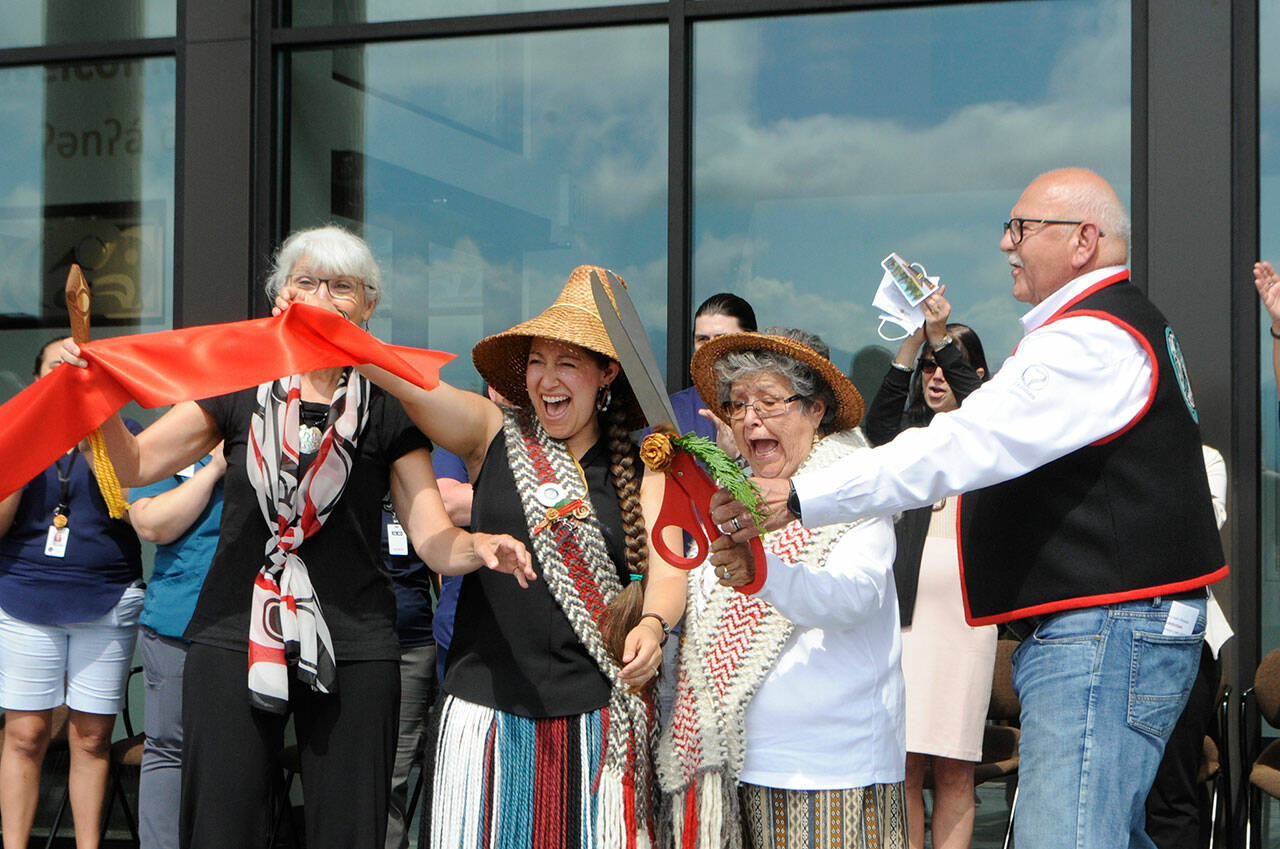It takes one small choice to change the course of someone’s river.
That’s the message Loni Greninger, Jamestown S’Klallam Tribe’s council vice chair, shared with hundreds of people on Saturday at the grand opening event of the Jamestown Healing Clinic, a facility that opened July 6 to help people treat opioid use disorder.
Standing next to Elaine Grinnell, her grandmother and storyteller who taught her the story, Greninger spoke about a grandfather teaching his youngest grandson life lessons. At one point, he pulled a rock from a river and they watched the hole fill with water.
Speaking as the grandfather, Greninger said, “There’s going to be times in your life where things are difficult and things are really hard for you, your loved ones.
“It’s going to be hard sometimes. Things that come into your life and try to shift the course of your river, but understand this, grandson: You have control of your life’s river, and it only takes one small act to change the course of your river for good.”
Built with that theme in mind in its building and landscape design, tribal leaders and community members spoke on Saturday about the people and efforts that went into the $17 million, 16,800-square-foot building at 526 S. Ninth Ave., based on the Swinomish Tribe’s Wellness Center in Anacortes.
For about seven weeks, staff have dispensed daily doses of methadone while providing wraparound services such as counseling, primary care, dental care and other aid.
Dr. Molly Martin, the clinic’s executive director, said in an interview the staff sees about 40-60 patients a day, with five to 10 new patients added each week.
On Saturday, Brent Simcosky, the tribe’s health services director, said the grand opening was about three years and five months to the day the tribe signed to purchase the clinic’s property.
With its location to view the Olympic Mountains, he said the clinic is “the perfect place to focus on recovery.”
Since it was announced, the clinic — formerly known as the medication-assisted treatment (MAT) clinic — has been a divisive topic with years of discourse at public forums, online and between community groups.
Simcosky said W. Ron Allen, tribal chairman/CEO of the tribe, told staff, “This is a marathon, not a sprint.
“When they see the results of our services, they will know (its value).”
Allen said tribal leaders stayed persistent through opposition and COVID-19 to not be deterred.
“It is about healing,” he said. “It is a journey for us, and the journey only begins in terms of what it’s going to do for our peninsula.”
Allen added, “There are many, many people who need our help, and that’s what we’re here to do.”
Among those to speak were Clallam County commissioner Mark Ozias, who commended the tribe for seeking a positive solution for the opioid epidemic.
“This place is already starting to become the beating heart that is starting to heal the divisions this town has suffered,” Ozias said.
“I hope that it provides a guide for us more broadly as communities like ours strive to heal themselves at such an important time in our history.”
Along with Greninger’s story and various speeches and recognitions, there was a ribbon cutting ceremony, a prayer and a blessing by Pat and Patsy Adams, tours of the facility, and tribal citizens and descendants performed two songs, “The Happy Song” and “We sing strong” used with permission from the Port Gamble S’Klallam Tribe and Joseph Price.
Future plans
Allen said the clinic is only the first step of the campus as they look to expand its services, including an evaluation and treatment psychiatric hospital. The state Legislature previously approved $3.25 million in planning funds for a 16-bed mental health crisis facility.
A timeline was not available as tribal staff continue to seek funding, they said.
During the clinic’s planning process, tribal officials dropped the mental health crisis facility because of a lack of funding availability, they said.
“Our objective here is to be value added,” Allen said. “This is only the beginning. We want to make this whole campus a full-service campus to help all those in need.”
Simcosky said they’ve begun paying for a social services navigator contracted through Peninsula Behavioral Health for $100,000 per year over three years, through the City of Sequim.
He also said a special committee of community agency leaders and members overseeing the facility’s impact on area services, such as police and fire, is going well, and everything they’ve voted on, they agreed unanimously. The committee was required by the city’s hearing examiner during an appeal process for the clinic’s application.
Martin said a majority of the patients come early in the morning.
“People are working, so it’s nice to have services before work,” she said.
Staff have begun serving an informal breakfast, too, where they interact more with patients to better help with their sobriety.
After finishing the grandfather story, Greninger said when those “struggling with addiction want to change the course of their river, all they have to do is make one small choice, one small act, and they reach out for help.”
“And when they’re ready to change the course of their river, the Jamestown S’klallam Tribe is going to be their friends waiting for them, ready to help them change the course of their river,” she said.
For more about the Jamestown Healing Clinic, visit jamestownhealingclinic.org. Intake hours are from 6 a.m. to 2 p.m. Monday through Friday, by walk-in or by calling 360-681-7755.
________
Matthew Nash is a reporter with the Olympic Peninsula News Group, which is composed of Sound Publishing newspapers Peninsula Daily News, Sequim Gazette and Forks Forum. Reach him at mnash@sequimgazette.com.

